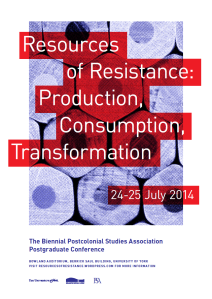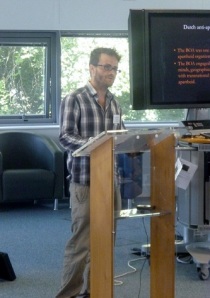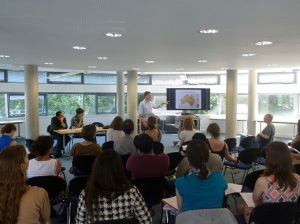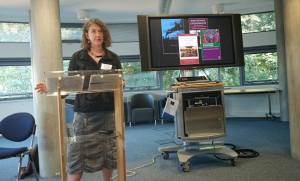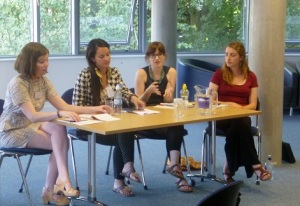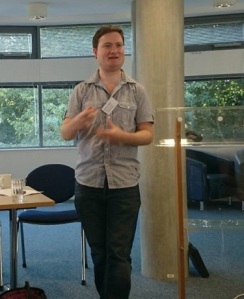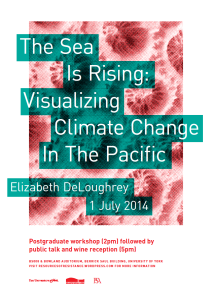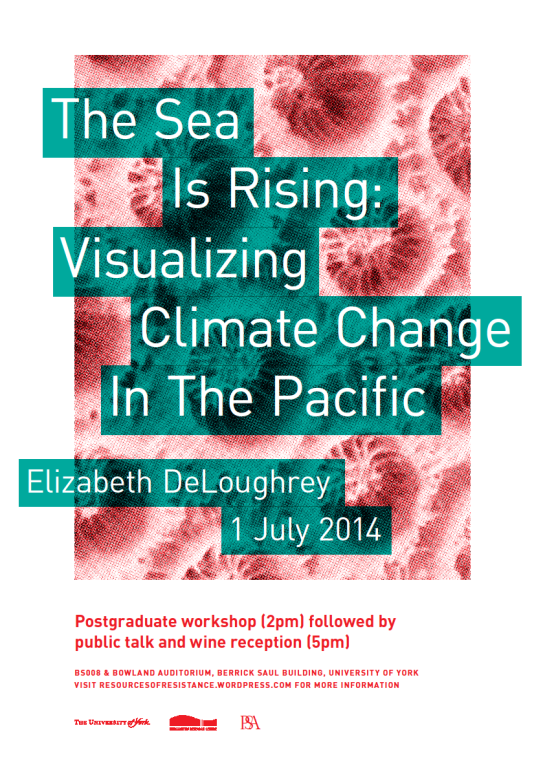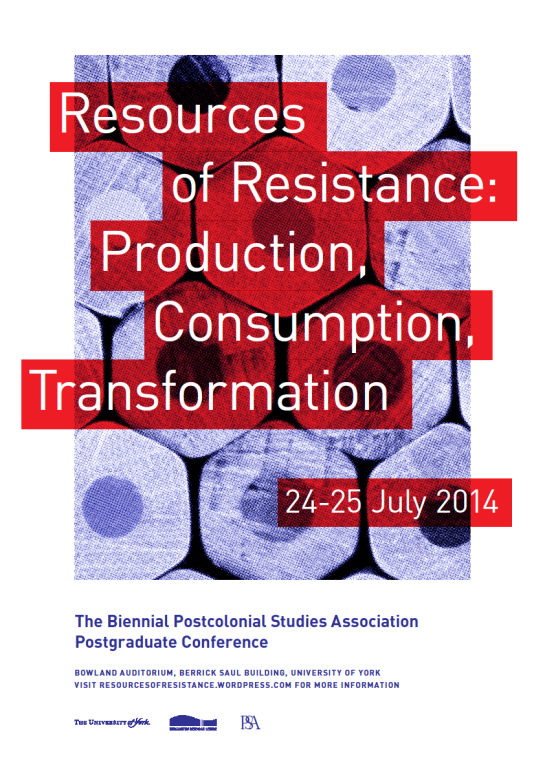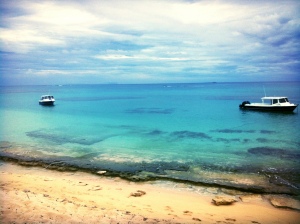By Hannah Boast
With contributions from Rebekah Cumpsty, Lucy Potter, and Nicola Robinson
On 24-25 July, we were privileged to host the biennial Postcolonial Studies Association postgraduate conference, ‘Resources of Resistance: Production, Consumption, Transformation’, at the University of York. Our guests included Dr Anthony Carrigan (Leeds), Dr Sharae Deckard (UCD), and Professor Jennifer Wenzel (Columbia), whose fascinating keynote lectures introduced many themes of discussion, and crystallised others. The conference brought to light a series of emergent concerns around the concept and role of resources across a range of disciplines and historical periods, through inspiring papers, lively discussion, and a warm and encouraging atmosphere.
While the conference developed in new directions of its own, it also grew out of a longer series of events at York. This includes a recent conference and study day hosted by the World Systems/Systems of the World research strand; a symposium on the 60th anniversary of the publication of Rachel Carson’s Silent Spring, in 2013; a strand of events on the theme of Food Studies; a postgraduate workshop, ‘Social Water’, held by the White Rose Hydropolitics Network; and a research seminar and talk on oceanic studies by Professor Elizabeth DeLoughrey (UCLA), who we were delighted to welcome to York at the start of July.
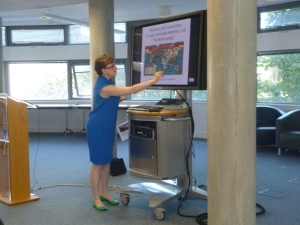
Dr Sharae Deckard delivering her keynote lecture. All photographs in this post by Diana Abia and Sam Perks.
As we noted in the Call for Papers, the production, consumption and transformation of resources represents a crucial aspect of capitalism’s post-2008 efforts at recovery. A focus on resources offered, we thought, a way to reorient ecocritical debate towards pressing contemporary concerns of ecology, economy, and exploitation, rather than to the ecocentric platitudes into which ecocriticism can sometimes be diverted. At the same time, we noticed a potential point of convergence between older postcolonial vocabularies of resistance and increasingly popular theories of nonhuman agency in ecocritical scholarship. Was there a way to tie these together, in order to highlight resources as pressure points of both human and nonhuman acts of resistance? And how might reading resources and commodity chains comparatively and transnationally, following the Saidian ‘contrapuntual reading’ that was so skilfully demonstrated by Professor Wenzel in her keynote lecture at the conference, enliven our individual research projects? These were the questions circling in our conversations when writing the Call for Papers and which we hoped – and were delighted to see – emerging during the conference.
Papers explored a huge range of different commodities and the social and ecological formations to which they have given rise, examining the ways in which world economic cycles of boom-bust, export-import, can create what Jason Moore terms ‘ecological regimes’ (2008). We heard about oranges, from Hugh Crosfield; silver, from Jay Parker; iron, from Benjamin Holgate; water, from Hannah Boast and Saira Fatima Dogar; oil, from Amber Murrey; plastic, from Treasa De Loughry; land, from Puneet Dhaliwal; tea and coconuts, in Dr Deckard’s excellent keynote lecture; and national infrastructures such as electricity grids, in Professor Wenzel’s equally fascinating keynote. Many speakers examined the interactions between modes of control and modes of resistance through the prism of resources. Crosfield, for instance, discussed the apartheid-era appropriation and repurposing of advertising campaigns for the South African citrus exporter Outspan in 1970s Holland, by the activist group Boycott Outspan Action.
Less conventional resources also emerged, such as elephants, wolves and other ‘charismatic megafauna’, in papers from Frances Hemsley, Annette LaRocco, and Margot Young. Sam Perks discussed the popular nature documentary series Planet Earth as a ‘resource’ marketed around the world by the BBC, while Rebecca Duncan explored biomediated affect as a ‘resource’ in Lauren Beukes’ novel Zoo City. Karen Jackson examined broader theorisations of resource consumption through Larissa Lai and Rita Wong’s long poem sybil unrest, while Dr Carrigan and Dr Deckard’s keynotes raised questions around Bangladeshi and Sri Lankan literature respectively as commodities in the world literary market.
Other papers dealt with the absence of particular resources from global or national literatures. Holgate, for instance, highlighted the shortage of literature on the mining industry, while Boast discussed the absence of depictions of Israel’s ‘urbicidal’ violence against Palestinian water infrastructure from Palestinian literature. A lack of literary attention to resources, and to ecological and human disasters, also recurred in two keynote lectures. Dr Deckard explored the low levels of literary concern with Sri Lanka’s tea plantations, and Dr Carrigan’s lecture focused on the neglected ‘compound catastrophes’ of the Bangladesh Liberation War and Bhola Cyclone of 1970-1971.
The issue of resource sovereignty recurred repeatedly, as Professor David Attwell observed in his response to Professor Wenzel’s lecture, in which it was a major theme. Papers examined the range of scales over which sovereignty might be held, from the national scale to the global commons, as in the various papers on nature conservation. Others explored local scales, such as Bürge Abiral’s examination of the permaculture in Istanbul, while the spatial zones of the centre and periphery also underlaid much of the discussion during the conference.
Ownership and autonomy were prominent concerns in relation to resource sovereignty, found in Dhaliwal’s paper on the primacy of control of land for the Zapatista movement; in LaRocco’s discussion of conflicts between local and national priorities in Botswana’s hunting laws; in Priyasha Mukhopadhyay’s examination of nineteenth century famine in India; and in Rebekah Cumpsty’s account of remapping the spaces of Johannesburg and New York City. These concerns also emerged in all three keynote lectures, in connection with different takes on the concept of vulnerability. This theme resonated through Dr Deckard’s lecture on the rapid shifts in ‘ecological regime’ in Sri Lanka brought about by environmental exhaustion, market fluctuations, and colonial control.
Violence, in multiple forms, was an inescapable theme of the conference. Murrey examined ‘structural violence’ as a way of capturing the intersecting and long-term effects of an oil pipeline between Chad and Cameroon, while Boast applied Rob Nixon’s concept of ‘slow violence’ to the ongoing public health crisis in Gaza brought about by Israeli-induced water shortages. ‘Slow violence’ also recurred in Dr Carrigan’s account of the temporalities of compound disasters and of uneven processes of recovery. Themes of disaster and recovery continued to recur, particularly in Christine Gilmore’s account of the displacement of the Nubian people during the construction of the Aswan Dam, and their subsequent attempts to stage social and cultural recovery.
While the ‘slow’ and ‘structural’ forms of violence discussed were primarily practiced by the state or by corporations, Professor Wenzel’s lecture discussed attacks on national infrastructure as a form of resistance by non-state actors. De Loughry’s paper, meanwhile, contained an indictment of violence against the nonhuman environment, in its account of the ecocidal results of our love affair with plastic.
The questions of forms and genre, and their uses in advocacy, policy, and cultural creation preoccupied many speakers. These themes were introduced by Dr Deckard, whose paper explored the relationship between commodity regimes, plantation aesthetics, and irrealism, coining the term ‘Sri Lankan tea gothic’. The second day also began with debates on form, provoked by Dr Carrigan’s invocation of the term ‘catastrophic realism’ to describe styles of writing emerging in the wake of a disaster. Boast’s paper discussed memoir and testimony in humanitarian work; Murrey and Perks examined the documentary; and Jackson, the ‘long poem’. Holgate, meanwhile, debated postcolonial magical realism, while Duncan examined the ‘affective economies’ of Gothic literature in a neoliberal world.
Many speakers were concerned with how their research might reach beyond their own discipline, or beyond academia, to governmental, non-governmental, and institutional policy and practice. The conference certainly indicated the potential for useful exchange and collaboration between researchers of different disciplinary backgrounds, with the ethnographic fieldwork presented in the conference by speakers including LaRocco, Murrey and Dhaliwal complementing and providing material evidence for literary readings. Dr Carrigan’s paper sparked discussion on how literary scholars might engage in dialogue with practitioners and policymakers, to gain insight, and even to influence practice. This process, and its difficulties, was also discussed by Gilmore, LaRocco, and Murrey, in their accounts of the clashing priorities of national authorities and affected communities.
Finally, the theme which perhaps pointed towards the most promising new directions was that of imagining alternatives. While the prospect of environmental apocalypse came up in discussion, particularly with reference to Fredic Jameson’s famously provocative observation that it is easier to imagine the end of the world than the end of capitalism, many papers sought to renegotiate the terms of debate by proposing alternative endings to capitalist environmental and human exploitation. Dhaliwal examined alternative practices of land usage and community organisation; Abiral explored permacultural living techniques; and a number of papers, notably Dominic Davies’, proposed alternative literary reading practices. Still, as Dr Carrigan noted, the process of ‘transformation’ mentioned in the conference title remained underexplored. So, we hope, it represents a keyword that will resonate through coming work in postcolonial studies, and shape the direction in which conversations that began at the conference will unfold into the future.
Resources of Resistance marks a sea change that has taken place in postcolonial studies over the last five years, which Professor Wenzel pertinently traced through her visits to York. At York’s 2010 conference, ‘What Postcolonial Theory Doesn’t Say’, she argued convincingly that the environment was a marked absence in postcolonial studies. Now, it would be impossible to say that this was the case.
